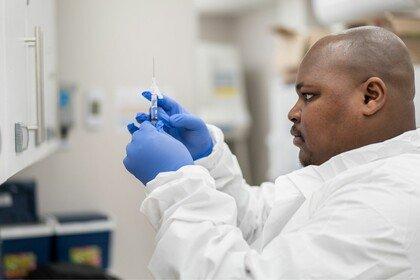
Antimicrobial resistance: it’s time for global action
Antimicrobial resistance (AMR) is one of our greatest public health threats. Find out more about Wellcome's work on AMR.
Tackling the growing threat of antimicrobial resistance requires all the tools we have at our disposal — including vaccines.

Jack Cole / Wellcome

Head of Vaccines, Infectious Disease, Wellcome

Head of Vaccines, Infectious Disease, Wellcome
Antimicrobial resistance is a leading cause of death and disability worldwide. In 2021, it caused over a million deaths globally and was linked to almost five million.
Discovering new antimicrobials to replace those that no longer work is essential, but it isn’t the only way to tackle antimicrobial resistance.
Vaccines can help prevent the spread of infections. Fewer infections mean fewer drug-resistant infections are transmitted and fewer antimicrobials are used – therefore further reducing the risk of antimicrobial resistance.
Vaccines also have a unique advantage because resistance to vaccines is incredibly rare. The same routine vaccines we give to young children for diphtheria and whooping cough are still used 70 years on. As a result, we can roll out vaccines to as many people as possible without the risk of resistance developing.
In fact, vaccines work better the more people get them.
Increasingly, evidence shows that vaccines are an essential tool for reducing antimicrobial resistance. World leaders recognised this important role in the 2024 UN political declaration on AMR.
Vaccines have been shown to prevent drug-resistant infections – for example, vaccines for H. influenzae b. and S. pneumoniae dramatically reduced the burden of the diseases and the incidences of resistant strains.
Vaccines can also prevent antibiotic use. A study by One Health Trust found that in 18 low- and middle-income countries, each year the rotavirus vaccine could prevent almost a third of antibiotic-treated diarrhoea episodes in children under two years old. Similarly, the pneumococcal conjugate vaccine (PCV) could avert 23.8 million antibiotic-treated acute respiratory infections.
The latest report from the World Health Organization found that better use of vaccines could reduce antibiotic use by 2.5 billion daily doses annually. The analysis also estimated that increasing the coverage of existing vaccines could prevent up to 106,000 deaths linked to antimicrobial resistance every year. While developing new vaccines could save an additional 543,000 lives.
In 2019, Wellcome funded 11 research projects to investigate how vaccines impact AMR across different pathogens, settings and research methods. These studies aimed to fill critical evidence gaps – particularly in low- and middle-income countries – and to inform policy decisions with real-world data.
Read our report summarising the evidence and policy implications
In 2019, Gavi, the Vaccine Alliance, supported Pakistan to introduce typhoid vaccines into its routine immunisation following years of drug-resistant typhoid outbreaks. A census survey cohort study has shown that this was over 90% effective in protecting against multi-drug-resistant Salmonella Typhi in young children.
Gavi supports several vaccines that protect against antimicrobial-resistant diseases by reducing the transmission of resistant strains and reducing antibiotic use. And in their 2024 Vaccine Investment Strategy, impact on antimicrobial resistance was used as an evaluation criteria for selecting new vaccines into their portfolio.
At Wellcome, we support research to better understand the global burden of antimicrobial resistance and accelerate the development of new interventions. This has included funding global partnerships (like CARB-X and GARD-P), as well as evidence evaluation and research. For example, projects assessing the impact of vaccines on the health burden of antimicrobial resistance and how diseases like rotavirus and Shigella affect antibiotic prescribing and use.

Antimicrobial resistance (AMR) is one of our greatest public health threats. Find out more about Wellcome's work on AMR.
However, while recent years have seen a significant increase in initiatives to tackle antimicrobial resistance and increase our understanding of the role vaccines can play – it hasn’t been enough.
Antimicrobial resistance is one of the greatest health challenges of the 21st Century. We cannot neglect the crucial role of vaccines in combatting this threat.
It is vital that we continue to strengthen and utilise the evidence on the impact of vaccines on antimicrobial resistance.

Charlie Weller has been at Wellcome since 2014. In September 2021, she became Head of Prevention in the Infectious Disease team after five years leading the vaccines programme at Wellcome to enable the development of new and improved vaccines and the better use of vaccines.
Connect with Charlie:


